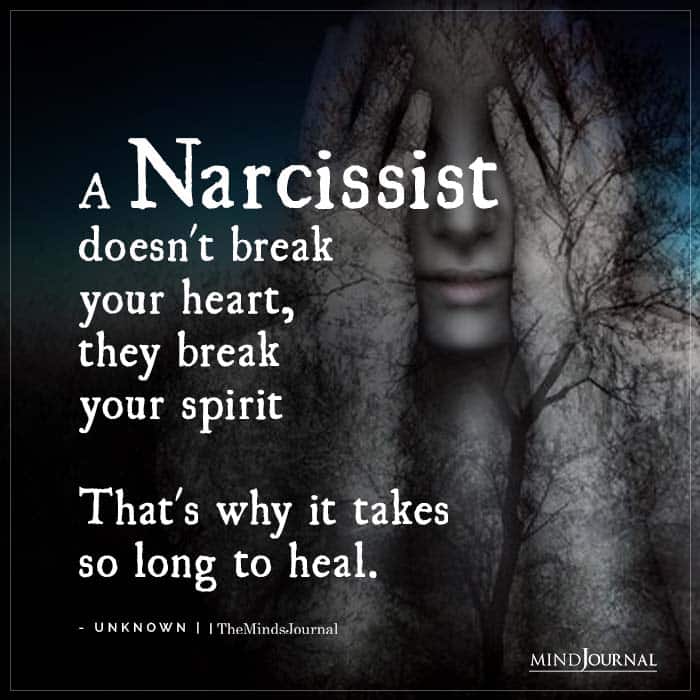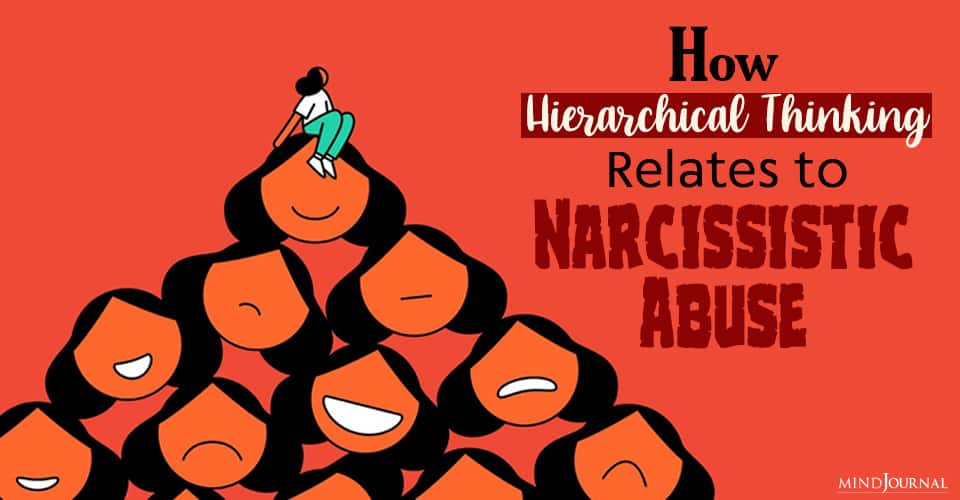How hierarchical thinking relates to narcissistic abuse? Narcissistic abuse starts when the idealizing ends.
Written by – Elinor Greenberg
Key Points: Narcissists see eveyone as either above them or below them in status. If you are above them in status, they will idealize you. If they view you as below them in status, they will ignore, devalue, or be nice depending on their mood. If your status drops, their positive feelings for you are likely to disappear
As a psychologist who specializes in personality disorders, I work with people who have narcissistic personality disorders and people who are trying to survive a relationship with someone with a narcissistic personality disorder. One of the most frequent questions I get asked by non-narcissists is, “Why did they switch from idealizing me and praising everything I do to devaluing me and treating me like worthless garbage?”
The first thing that I explain is that narcissists construct dominance hierarchies based on whatever status indicators they believe are important. These status indicators can be anything at all, but the most common ones relate to wealth, beauty, social status, athletic ability, intelligence, and education. This is true for all people with narcissistic personality disorder no matter what their subtype.
By hierarchical, I mean that they see other people and things as either above them in status and idealizable or below them in status and worthless. If you presume yourself their equal and are not clearly above them in status, they will start a dominance fight with you in an attempt to prove that they are above you.
Once you start to pay attention to the relationship between narcissistic personality disorders, interpersonal relationships, and hierarchical thinking, you will find plenty of examples that were right under your nose all along.
Note: I am using the terms narcissist, narcissistic, and NPD as shorthand ways to describe people who qualify for a diagnosis of narcissistic personality disorder.
Related: What Is Healthy Narcissism? How Does it Differ from Self Love
When you are considering narcissistic hierarchies, here are some things to pay attention to:
Who Do Narcissists Idealize?
People with NPD automatically idealize virtually anyone who they consider to have higher status than they do. They will appear to truly care about these people, but in reality, they mainly care about the person’s place in the narcissist’s favorite status hierarchy.

Example—Bob and his Boss
Bob, an exhibitionist narcissist, treated his boss Samuel at work as if he were his favorite person in the world. He sent cards and little gifts for Samuel’s wife and his children’s birthday. He often went to lunch with him. They became so close that every Summer Bob was invited to spend a week at Samuel’s family beach house.
If you asked Bob about Samuel and his family, he would tell you how much he loved them and what great friends they were. That is why we were all so surprised that when Samuel was moved to a different department where he had less status, Bob never mentioned him again. He stopped having lunch with Samuel, stopped buying gifts, and dropped him as a friend.
Suddenly, Bob started treating his new boss Richard the way he used to treat Samuel. Now Richard’s wife and children received the thoughtful cards and gifts that used to go to Samuel’s family.
When I asked Bob about this shift, he didn’t see anything surprising about his behavior. He simply took it for granted that he would only befriend those people who he saw as above him in the pecking order. When Samuel’s status dropped, Bob automatically dropped him.
Related: 9 Types of Toxic People That Will Rob You Of Your Happiness
Who Do Narcissists Devalue?
Narcissists treat people who they view as below them in status as inconsequential losers. Most people with NPD will feel free to ignore or devalue them. This includes lovers, spouses, friends, and family members. If they are nice to them at all, it is usually because they are in a good mood and it feeds their self-esteem to be seen as generous or kind.
Example—Cinderella and her Stepmother
I learned a great deal about personality disorders as a child by reading fairy tales. Most of us know the story of Cinderella. She was the beloved daughter of her widowed father. When her father remarried a haughty woman with two spoiled daughters, Cinderella lost her place in the family status hierarchy.
Her stepmother made certain that she and her daughters got the best of everything and Cinderella was demoted to being the family servant. She was now mockingly called Cinderella because her stepmother made her sleep on the floor in the kitchen. She was often so cold that she got covered with cinders from trying to stay warm by sleeping close to the kitchen’s fireplace.
Also read The Difference Between Narcissism And Confidence
Why Do Narcissists Make So Many Comparisons?
Hierarchical thinking leads to comparisons because it is so important for narcissists to clearly understand who to idealize and who can safely be ignored. This means that if you know someone who is constantly comparing one person to another, this could be a sign of NPD. Of course, I would not make a diagnosis on this factor alone.

Example—The Golden Child and the Scapegoat
Jenny was her narcissistic mother’s “Golden Child.” Jenny was a bright, adorable child. When she was born, her mother told everyone that Jenny was destined to do great things.
When her little sister Jill was born, she was constantly negatively compared to Jenny. Jill grew up hearing, “At your age your sister could already read.” Or, “It’s a shame you will never be as pretty as your sister.”
Jill was trained from early childhood to have low self-esteem and see herself as inferior to her sister Jenny. She was the family scapegoat. It took her years of psychotherapy to realize that she was just as talented, attractive, and worthwhile as her older sister—even if her mother saw her as below her sister in status.
Why Do Narcissists Engage In Dominance Fights?
So, if you suck up to those above you in status and devalue those below you in the hierarchy, what about people who are your equals? Well, if you have NPD, there is no such thing as an equal in a pure hierarchy. This leads people with NPD to engage in nasty and sometimes quite lengthy dominance fights.
Example—Candy and Mary
Candy and Mary were work colleagues. They both had similar jobs. Mary assumed that they were friends. Candy, who had a closet narcissistic disorder, envied Mary and saw her as a competitor. Candy covertly did whatever she could to get other people to see Mary as inferior and inadequate.
For those of you who are unfamiliar with the term “closet narcissist,” it was invented by the object relations theorist James F. Masterson (1926-2010) to describe a subtype of people with NPD who want to be special but are too insecure to openly claim the spotlight. Instead, they find a roundabout, manipulative and indirect ways to accomplish their goals. Other theorists call this subtype by different names. Sometimes it is referred to as covert, fragile, or vulnerable NPD.
If you want to read more about this subtype of NPD, please check out Masterson’s book, The Emerging Self (1993), Paul Wink’s paper, “Two faces of narcissism” (1991), or my book: Borderline, Narcissistic, and Schizoid Adaptations (2016).
In this case, Candy told stories about Mary’s inadequacies behind her back. Under the guise of being sympathetic, she would go to lunch with their boss and say things like, “It is such a shame that Mary is struggling so hard to do her job. I know she needs help, so I often simply pitch in and then let Mary take the credit. Poor Mary! She is so overwhelmed!”
When a promotion became available, Candy got it and cemented her status as above Mary in the company’s hierarchy. Mary’s reputation never recovered and she never found out that Candy had engineered the whole thing.
Related: What Is Healthy Narcissism? How Does it Differ from Self Love
Summary
All people with narcissistic personality disorder are hierarchical in their thinking. They automatically assess everyone they meet with regard to where they fit into the status hierarchy they value. There are no exceptions for friends, family members, colleagues, or lovers. Everyone is seen in rather stark terms: “Do I have a use for this person? Will this person help me rise in the hierarchy? Are they above or below me?”
References : Masterson, J. (1993). The Emerging Self. NY: Brunner/Mazel. Greenberg, E. (2016). Borderline, Narcissistic, and Schizoid Adaptations. NY: Greenbrooke Press. Wink, P. (1991). Two faces of narcissism. Journal of Personality and Social Psychology, 61 (4), 590-597.
Originally Appeared On: Psychology Today Republished with permission











Leave a Reply